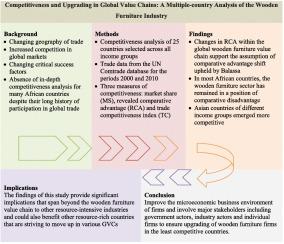Forest Policy and Economics ( IF 4.0 ) Pub Date : 2022-04-23 , DOI: 10.1016/j.forpol.2022.102737 Mesumbe Bianca Epede 1 , Daoping Wang 2

|
The rise of global value chains (GVCs) has increased competition in global markets because of the constantly changing critical success factors which result in shifting comparative advantages. In such a context, countries are increasingly interested in assessing their relative competitiveness in order to better shape policies and business strategies. Going from UN Comtrade data, this paper provides a rich competitive analysis of the wooden furniture industry for 25 nations selected across all income groups and from diverse geographical regions. Balassa's index of Revealed Comparative Advantage (RCA) along with two other competitiveness measures (market share and trade competitiveness) enable to conclude that, most African countries have remained in a position of comparative disadvantage, with no significant improvement over the years. However, Asian countries of different income groups emerged more competitive and act as palpable examples of successful upgrading in this sector. European and American countries on their part, despite exhibiting strong competitive positions, are nonetheless experiencing downward trends. This paper further highlights that, successful upgrading in the wooden furniture value chain can only be made possible by the inevitable interplay of actions by major stakeholders like government and industry actors, as well as individual firms. The findings of this study provide practical and policy implications whose significance span beyond the wooden furniture value chain.
中文翻译:

全球价值链的竞争力与升级:木制家具行业的多国分析
全球价值链 (GVC) 的兴起加剧了全球市场的竞争,因为不断变化的关键成功因素导致了比较优势的转移。在这种情况下,各国越来越有兴趣评估其相对竞争力,以更好地制定政策和商业战略。本文来自联合国 Comtrade 数据,对来自所有收入群体和不同地理区域的 25 个国家的木制家具行业进行了丰富的竞争分析。Balassa 的显性比较优势指数 (RCA) 以及其他两项竞争力指标(市场份额和贸易竞争力)得出的结论是,大多数非洲国家仍然处于比较劣势,多年来没有显着改善。然而,不同收入群体的亚洲国家变得更具竞争力,并成为该领域成功升级的明显例子。欧美国家尽管表现出强大的竞争地位,但仍处于下降趋势。本文进一步强调,只有通过政府和行业参与者等主要利益相关者以及个体公司的行动不可避免的相互作用,才能实现木制家具价值链的成功升级。本研究的结果提供了实际和政策意义,其意义超越了木制家具价值链。尽管表现出强大的竞争地位,但仍处于下降趋势。本文进一步强调,只有通过政府和行业参与者等主要利益相关者以及个体公司的行动不可避免的相互作用,才能实现木制家具价值链的成功升级。本研究的结果提供了实际和政策意义,其意义超越了木制家具价值链。尽管表现出强大的竞争地位,但仍处于下降趋势。本文进一步强调,只有通过政府和行业参与者等主要利益相关者以及个体公司的行动不可避免的相互作用,才能实现木制家具价值链的成功升级。本研究的结果提供了实际和政策意义,其意义超越了木制家具价值链。











































 京公网安备 11010802027423号
京公网安备 11010802027423号